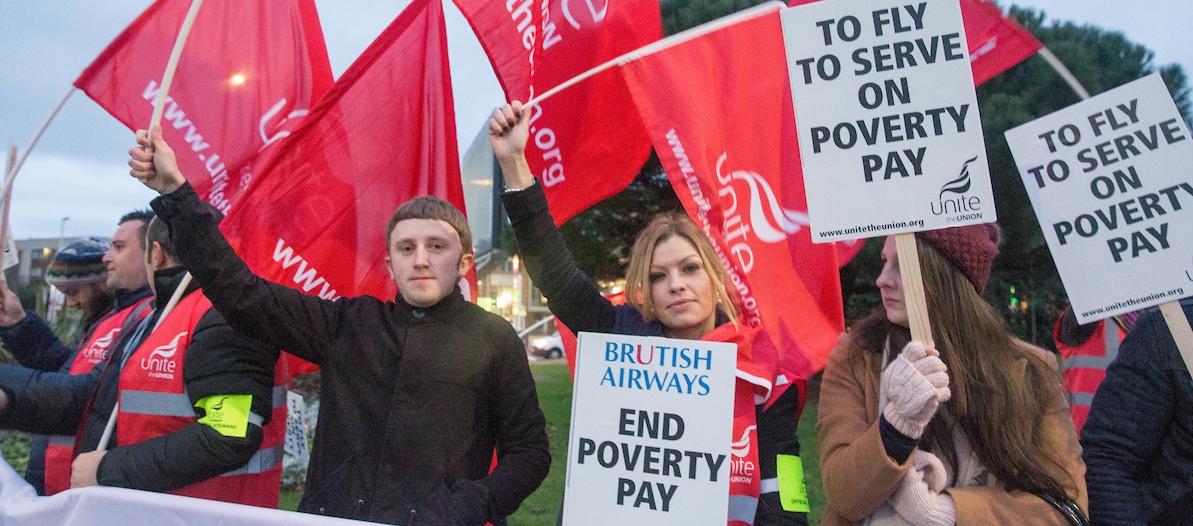Time for timid is past
A resounding 150,000 people turned out for the TUC march and rally, Britain needs a pay rise, on Saturday (October 18), including a multitude of Unite members from around the country and across different sectors to demand fair pay from their employers.
Marchers additionally called for an end to government austerity that’s ruthlessly driven down living standards for the majority of working people.
The march commenced to great fanfare at Embankment and culminated in Hyde Park, where trade union leaders, including Unite’s Len McCluskey inspired the gathering crowds with rousing speeches.
“We need more than anger”
In his speech, Unite general secretary Len McCluskey denounced the coalition government for attempting to destroy every gain working people have made since 1945.
“[This government’s] mission is to dismantle the NHS – slicing it up bit by bit and handing it on a silver platter to their friends in the private health companies,” he said.
“They seek to destroy the welfare state – characterising anyone who uses the benefit system in their time of need as a scrounger,” he added.
“And they have devastated local government to a point where care of the elderly is now defined by spreadsheet economics separated into 10 minute blocks, irrespective of the individual’s needs.”
McCluskey urged the crowds at Hyde Park to take their battle beyond the confines of Saturday’s march.
“We need more than anger,” he said. “We need to organise. We need to mobilise.”
“Britain needs more than a pay rise,” McCluskey added. “It needs a government that fights for working people like the Tories fight for the rich.”
McCluskey called on the Labour party to “stop being afraid of its own shadow” and outlined policies that would provide real alternatives to the Tories’ starvation regime, including tackling tax dodgers, building more homes, boosting the minimum wage immediately, and bringing banks under real public control.
He insisted the “time for being timid is past” and galvanised the cheering crowds to “keep the faith,” arguing that “people power can change the country for the better,” noting that history has repeatedly shown that strong working class movements can make a difference.
The tide that raises all boats
Harry Smith, author, RAF veteran and son of a Barnsley miner, who at 91, has lived through the Great Depression and the Second World War, has seen the success of such movements with his own eyes.
Smith gave one of the day’s closing speeches, inspiring marchers with a paean to his generation, which created the welfare state and enshrined the rights of trade unions to protect workers’ pay and conditions, after having experienced the “scourge of hunger and want” first-hand.
“But the crash of 2009 has changed everything,” he said.
“Today, Cameron’s government has robbed the vulnerable of their benefits to enrich the mighty, and they have snatched from the workers of this country the right to a dignified wage.”
Still, Smith insisted workers can “return the country to its rightful owners – the people.” He argued that above all, workers must continue fighting and demanding higher wages.
“You can be the tide that raises all boats,” he said, “as long as you stay strong and loyal to the one beneath.”
Unite’s members speak
Unite members echoed many of the concerns McCluskey and Smith addressed in their speeches, all of whom cited solidarity for workers everywhere as their reason for coming out to the march.
Jim Kelly, a London taxi driver, said he was marching against the government’s austerity measures.
“I think austerity affects everybody – self-employed people, unemployed people and people in work,” he said.
“As a cab driver driving around in London, you can see the pockets of poverty all around, and they seem to be sitting right next to very wealthy areas. Our society is becoming more and more polarised, and a lot of that comes down to the austerity measures of this government.”
Steve Sargent, a skills rep at BMW’s MINI plant in Oxford, said that even though they had gained a decent pay rise last year, he was attending the march in solidarity with everyone else’s who’s got a rotten deal.
“This isn’t just about BMW workers,” he said. “This is about British working people in general. There are people in the NHS and other public services who have been stifled over the past 10 years. We need to fight to get them a pay rise as well.”
Unite members from a range of different sectors identified problems that were specific to their industry or workplace.
“Farmworkers need a pay rise,” said Steve Leniec, Unite’s chair for the agricultural sector. “With the abolition of the agricultural wages board, that certainly ain’t happening. So we’re here to get the message across.”
Karis McCormack, cabin crew member for British Airways, said that four years after the airline’s very public strike, cabin crew are still suffering injustices.
“We’re about to be replaced by mixed fleet, who are on an hourly rate,” she explained. “People who have worked for the company for 20 or 30 years are about to be trodden on and their jobs taken away.”
Fred Gibbons pointed to the particularly “raw deal” that bus drivers get, even though they help transport millions of people around the country’s cities each day.
“In London, tube drivers get double the wages of bus drivers,” he said. “We don’t earn a living wage, but we have to take on lots of responsibility. We’re carrying 70-odd people on the bus at any given time, and if there’s an accident, you’re b****red.”
Click here for the full video of Len McCluskey’s speech at the TUC rally.
 Like
Like Follow
Follow


